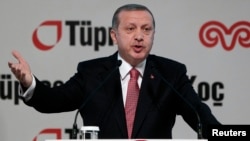After just two days of a nationwide strike by Turkey’s Metal Workers Union, the government invoked emergency powers to postpone the strike for 60 days, claiming national security was threatened.
Eyup Ozer, Metal Workers Union international relations officer, said the strike posed no threat to the country.
"It is a sector that produces wires, cables, fasteners and small stuff," he said. "Even in these companies they can ban a strike. So that means there is no right to strike.
"This has happened before," he continued. "The government also banned [strikes] in the glass sector and other sectors, too. The essence of this law was made after the coup d'état in the 1980s, but it's the worst use of this emergency law in the last few years."
Under the special powers invoked by the government, if no agreement is reached during the 60-day postponement, the union loses the right to represent the workers in the dispute, along with the right to call a strike. The Metal Workers Union is challenging the strike postponement in the courts, but similar legal challenges have failed.
Sharan Burrow, general secretary of the International Trade Union Confederation, said she was alarmed by Ankara’s treatment of the unions and warned that it would face growing scrutiny with it hosting this year's G20 summit.
"I think the situation has deteriorated and it continues," she said. "The government has to rethink its decision on rights. It is the host of G20 this year and the right to strike is fundamental.
"What we are seeing is a pattern. All of the strikes in the productive industries are being postponed, as they call it, but it really is an effective ban. We call on the government to both lift the ban, but also to actually sit at the table and negotiate."
The Turkish economy has slowed to 2 percent growth. The government has pushed through increasingly tough labor laws, along with a crackdown on labor activity, said political scientist Cengiz Aktar of Istanbul’s Suleyman Shah University.
"They prefer obedience," Aktar said. "Turkish industries are struggling to cope with low-cost countries, and of course the labor movement is paying."
Under the AK Party, which has ruled for more than a decade, trade union membership has fallen to about 1 percent of the workforce. But experts say unions still have influence, with their negotiated pay agreements usually setting the norm for the industry.
Ozer said the future of trade unions in Turkey is under threat.
"To join a union you have to go to a government-run website and get a password from a post office and register at the website," he said. "And then the employer may learn your membership. If they learn that there is union membership in their workplace, they will dismiss you immediately, without any real law protection. So it is quite difficult for a worker to join a union. In most cases, it means that you will lose your job. If you do not have an independent union in your workplace, there is no one to defend your rights and no one to defend your safety."
According to the U.N. International Labor Organization, Turkey is the worst in Europe and third-worst country in the world for workplace accidents. Experts warn that record is unlikely to improve if unions continue to decline in Turkey.










